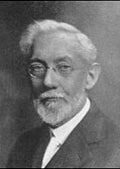the Second Week of Lent
Click here to join the effort!
Bible Commentaries
Larkin's Study of the Prophetic Book of Holy Scriptures Larkin on Revelation
New Testament
Author's Biography
Clarence Larkin (1850-1924) was an American Baptist pastor, Bible teacher, and author, renowned for his influential works on dispensational theology and eschatology. Born in Chester, Pennsylvania, Larkin's initial career was not in theology but in mechanical engineering and teaching. His precision and skill in draftsmanship, honed during his first career, later became instrumental in his theological works, for which he is best remembered.
Larkin's spiritual journey took a decisive turn when he experienced a profound conversion to Christianity at the age of 19. Although he continued in his professional career for a time, the pull towards ministry was undeniable. By 1882, he had been ordained as a Baptist pastor, marking the beginning of a new chapter in his life dedicated to the study and teaching of the Bible.
Larkin is perhaps best known for his book "Dispensational Truth or God's Plan and Purpose in the Ages," published in 1918. This work, along with others like "The Book of Daniel" and "The Book of Revelation," showcases his detailed and illustrative approach to Bible study. Larkin's use of intricate charts and diagrams to explain biblical prophecy and dispensationalism set his works apart and made them accessible to a lay audience as well as theologians.
Despite having no formal theological training, Clarence Larkin's deep and intuitive understanding of the Scriptures, combined with his ability to clearly articulate complex theological concepts, earned him respect and recognition in religious circles. His works have had a lasting impact on the study of biblical prophecy, influencing many subsequent theologians and Bible scholars.
Larkin spent his later years writing, teaching, and speaking about the Bible's prophetic passages. He passed away in 1924, leaving behind a legacy of detailed theological works that continue to be studied and appreciated by those interested in eschatology and dispensationalism. His methodical and illustrative approach to theology has made the mysteries of the Bible more understandable for generations of readers.
